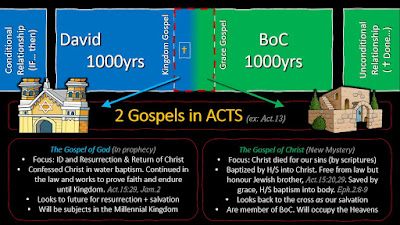Understanding the New Testament Gospel Differences (Part 6)
Understanding the New Testament Gospel Differences (Part 6 --- Call upon the name of the Lord or confess His name)
We continue with the comparison of the gospel of God and the gospel of Christ
by looking at key elements that distinguish them from each other. I recommend
to
start at the beginning of this comparison
to gain the necessary context of this series of posts.
Call upon the name of the Lord or Confess the Lord
In the Old Testament and the four Gospels, it was required by Jews to call upon the name of the Lord, or confess His name. The purpose of this was to proclaim Him as one's Messiah, to identify Him as your Lord and King. This requirement, to call upon the name of the Lord, or to confess Him as your Saviour, was a necessary requirement of salvation during the law dispensation and in the Kingdom gospel and the gospel of God.
Joel 2:32 And it shall come to pass, that whosoever shall call on the name of the Lord shall be delivered: for in mount Zion and in Jerusalem shall be deliverance, as the Lord hath said, and in the remnant whom the Lord shall call.
Although Jesus has fulfilled many prophecies and did countless miracles to prove His identity as the promised Messiah and Son of God, he never openly claimed it and it was up to a persons faith in their scriptures to believe in Jesus. This faith was made manifest by confessing His name before others, in addition to obeying the law and doing good works.
Luke 12:8 "Also I say to you, whoever confesses Me before men, him the Son of Man also will confess before the angels of God. 9 But he who denies Me before men will be denied before the angels of God.
Matthew 16:16 Simon Peter answered and said, "You are the Christ, the Son of the living God."
John 11:27 She said to Him, "Yes, Lord, I believe that You are the Christ, the Son of God, who is to come into the world."
Acts 8:37 Then Philip said, "If you believe with all your heart, you may." And he answered and said, "I believe that Jesus Christ is the Son of God."
Acts 9:20 Immediately he [Paul] preached the Christ in the synagogues, that He is the Son of God.
Confessing the name of Jesus, that He was the Christ, according to the
gospel of the kingdom meant believing Who He was, i.e., believing in His
name (John 3:18; Acts 2:21, 38, 3:6, 16, 4:7, 10, 12, 17, 18, 30, 5:28, 40, 41,
8:12, 16, 9:14, 15, 21, 27, 10:43, 48). The gospel of the kingdom and the gospel of God focused upon the
identity of Christ as the Messiah.
Salvation by grace today
For us today, in the dispensation of grace, confessing the name of the Lord is not a requirement for salvation. The gospel of grace, (our gospel) does not have conditions that we need to fulfil. Salvation today does not lie in conditions to fulfil but rather in trusting in Christ after we have heard and responded to the gospel.
Notice the account of the Philippian jailer's salvation experience. After hearing the gospel of Christ, the jailer asked; "Sirs, what shall I do to be saved." In Acts 16:31, Paul answered;
"Believe on (trust in) the Lord Jesus Christ, and thou shalt be saved…".
Here are a few other scripture passages to confirm this;
Rom.11:5-6 Even so then at this present time also there is a remnant according to the election of grace. 6 And if by grace, then is it no more of works: otherwise grace is no more grace. But if it be of works, then is it no more grace: otherwise work is no more work.
Eph.2:8-9 For by grace are ye saved through faith; and that not of
yourselves: it is the gift of God: 9 Not of works, lest any
man should boast.
One last point
The 'confession (profession)' of faith as seen in the verse below is often cited in the wrong context, and misused. The common 'sinner's prayer', and even the Roman Road salvation technique often uses this verse as instruction for a new believer to do in order to be 'saved.'
Rom.10:9-10 IF thou shalt confess with thy mouth the Lord Jesus, and shalt believe in thine heart that God hath raised him from the dead, thou shalt be saved. 10 For with the heart man believeth unto righteousness; and with the mouth confession is made unto salvation.
As mentioned in this post above, our salvation does not have conditions to fulfil in order to merit, or earn salvation! Notice how the above verse starts. "IF you will confess...". The word "if" is a condition. It's something required of you! The proper context of this verse in Romans is part of Paul's writings to Israel. In Romans chapters 9 to 11, Paul deals with instructions to the Jews based on the transition out of Israel's program and into the program to the Gentiles. Once we recognize this, we will clearly see that these instructions are not applicable to us.
Our salvation is simply to believe! To trust that the cross-work of Christ
is all sufficient to save us and justify us before God. Whether we call upon
the Lord or whether we are silent in our experience, it comes down to the
attitude of the heart and not to the words from the mouth.



Comments
Post a Comment